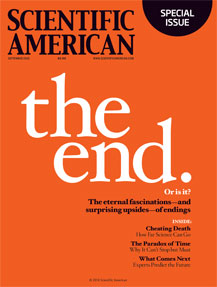What I Believe (about Markets and Morals)
A reply to Jerry Coyne
In his endearingly titled blog, “Michael, we hardly knew ye,” the venerable evolutionary biologist and slayer of creationist dragons Jerry Coyne (author of Why Evolution is True) wonders if I’ve gone ‘round the bend over capitalism and sold my skeptical soul to the Templeton Foundation, the alleged evil subsidizers of religious and capitalist propaganda. Allow me to set the record straight (again) for all my critics out there (and in reading the comments to Jerry’s blog there’s more than I thought, and many of them are darned right caustic!).
First, on the Templeton Foundation, I was invited to write a monthly column for their new magazine, Big Questions Online, and as with my work for them in years past, I’m allowed to write just about anything I like. It is interesting that Jerry and his commentators would hone in on this, my second column, ignoring my first column, which was a stinging rebuke of religion in general and Deepak Chopra’s New Age spirituality in particular. No one could possibly read my list comparing God 1.0 to God 2.0 (omnipresent—nonlocal; fully man/fully God—wave/particle duality; miracle—wave function collapse, etc.) and conclude that I’m the pay of a religious propaganda machine. And if that doesn’t seal the deal for ya, the God critique was originally my second column, but the BQO editors liked it so much that they bumped it up to number 1, and it was, in fact, the most popular article on the site for the entire month. So there!
Second, I think I made a mistake in mentioning “capitalism” at the beginning of the column on markets and morality, because (1) the article is really about trade, not capitalism per se; and (2) that word seems to set some people off into MichaelMoorish-like paroxysms of rage, engaging the limbic system full throttle and governing back the prefrontal cortex, resulting in red-faced, spittle-spewing tirades about Gordon Gekko and Bernie Madoff. In fact, as I depict trade (especially in my book The Mind of the Market, which, curiously, few of my critics have actually read), it should be something embraced by all liberals because trade empowers individuals over corporate entities of all types (from governments and religions to actual corporations). By trade I just mean the exchange of ideas, products, or services between two or more people, and by free trade I just mean that people can engage in such exchanges without hindrance from third parties (thieves, thugs, highwaymen, bribe takers, tax collectors, and the like)—think eBay, or a flea market, or a farmer’s market. My main point in citing all those primate studies is to show the evolutionary continuity between nonhuman primates and ourselves in the evolved sense of fairness in all such exchanges (grooming, food sharing, etc.), and especially that trade helps attenuate the pervasive xenophobia between strangers, the result of our natural-born tribalism. I’m not claiming that trading hunter-gatherers were early capitalists; no, groups traded for assorted reasons having more to do with forming political coalitions against other dangerous groups (the enemy of my enemy is my friend) than in increasing primitive GDP.
Third, as for modern capitalism, I’m not a naïf—I think of it as akin to professional sports—competitors will cheat if they can get away with it, and so in order for the system to work there needs to be a clearly defined set of rules that are strictly enforced with severe consequences for violations. And I agree with Ralph Nader that there is far too much corporate welfare (what Adam Smith called rent seeking), in which companies will try to game the system by getting special privileges, handouts, tax breaks, and the like in order to gain an unfair advantage over competitors, especially over foreign competitors, which Adam Smith warned his readers about in The Wealth of Nations.
Fourth, Coyne raises an important objection when he asks rhetorically: “Is Apple moral? Is General Motors moral? The questions make no sense. These corporations may act morally by donating money to good causes and so on, but it’s ludicrous to claim that selling cars or computers promotes morality.” Therefore, he concludes: “I don’t see capitalism as innately conducive to morality. It is, at best, orthogonal to it. It may make us more prosperous, but it doesn’t make us better people.”
This gets to the point of my work in evolutionary economics (the subject of The Mind of the Market). The evolved psychology behind trade does, in fact, makes us better people. Nonzero exchanges between strangers (“you give me that which I want and I’ll give you this which you want”) has measurably positive effects on subjects in experiments, such as those conducted by neuroeconomist Paul Zak, who discovered a significant boost in oxytocin in subjects making fair exchanges in the Ultimatum Game and other experimental conditions, and even reversed the causal vector by giving some subjects hits of oxytocin through a nose spray (normally used to induce labor), which resulted in those subjects being more generous and fair in exchange games (that involve real money).
Trade makes us less likely to kill our potential trading partners. As Jared Diamond once told me about his research on Papua New Guinea hunter-gatherers: “Should you happen to meet an unfamiliar person in the forest, of course you try to kill him or else to run away. Our modern custom of just saying hello and starting a friendly chat would be suicidal.” And yet something happened in the 1960s to bring about more peaceful interactions. Initially, peace was imposed upon the native New Guineans by fiat from the Western colonial government that ruled over the territory, but officials then insured continued peace by providing goods that the people needed, as well as the technologies to enable them to continue producing more resources on their own. In less than one generation, New Guinean hunter-gatherers who were fighting each other with stone tools were suddenly New Guinean consumer-traders operating computers, flying planes, and running their own small businesses. Where goods crossed New Guinea frontiers, New Guinea armies did not.
This is an example from my book of what I call Bastiat’s Principle, from an observation by the 19th-century French economist Frédéric Bastiat: “Where goods do not cross frontiers, armies will.” Although trade is not a sure-fire prophylactic against between-group conflict (there are exceptions to Thomas Friedman’s observation that two countries with MacDonalds don’t fight, but as a first order approximation it is accurate), it is an integral component to establishing trust between strangers that lessens the potential volatility that naturally exists whenever groups come into contact with one another, especially over the allocation of scare resources that have alternative uses, the very definition of economics.
And that brings us back full circle to trade, markets, and morality.






